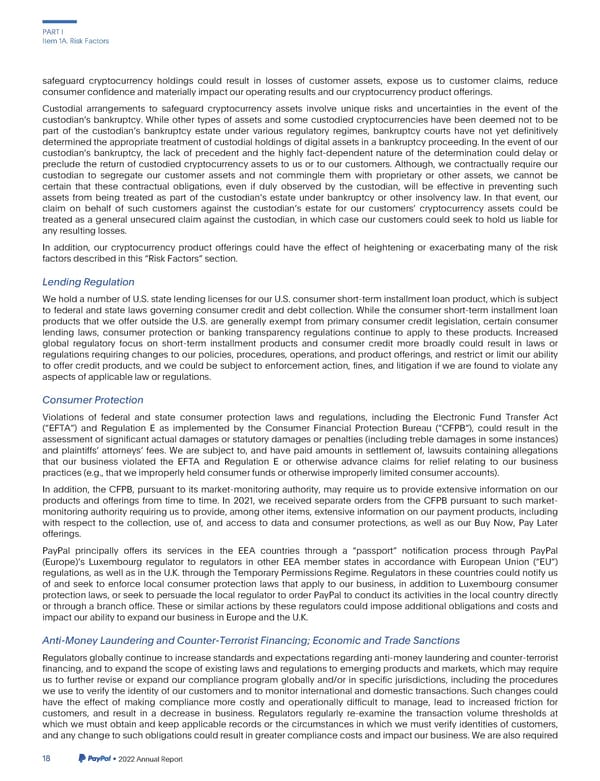PARTI Item1A.RiskFactors safeguard cryptocurrency holdings could result in losses of customer assets, expose us to customer claims, reduce consumerconfidenceandmateriallyimpactouroperatingresultsandourcryptocurrencyproductofferings. Custodial arrangements to safeguard cryptocurrency assets involve unique risks and uncertainties in the event of the custodians bankruptcy. While other types of assets and some custodied cryptocurrencies have been deemed not to be part of the custodians bankruptcy estate under various regulatory regimes, bankruptcy courts have not yet definitively determinedtheappropriatetreatmentof custodialholdings of digital assets in a bankruptcy proceeding.In the event of our custodians bankruptcy, the lack of precedent and the highly fact-dependent nature of the determination could delay or preclude the return of custodied cryptocurrency assets to us or to our customers. Although, we contractually require our custodian to segregate our customer assets and not commingle them with proprietary or other assets, we cannot be certain that these contractual obligations, even if duly observed by the custodian, will be effective in preventing such assets from being treated as part of the custodians estate under bankruptcy or other insolvency law. In that event, our claim on behalf of such customers against the custodians estate for our customers cryptocurrency assets could be treated as a general unsecured claim against the custodian, in which case our customers could seek to hold us liable for anyresultinglosses. In addition, our cryptocurrency product offerings could have the effect of heightening or exacerbating many of the risk factors describedin this “Risk Factors” section. LendingRegulation WeholdanumberofU.S.statelendinglicensesforourU.S.consumershort-terminstallmentloanproduct,whichissubject to federal and state laws governing consumer credit and debt collection. While the consumer short-term installment loan products that we offer outside the U.S. are generally exempt from primary consumer credit legislation, certain consumer lending laws, consumer protection or banking transparency regulations continue to apply to these products. Increased global regulatory focus on short-term installment products and consumer credit more broadly could result in laws or regulations requiring changes to our policies, procedures, operations, and product offerings, and restrict or limit our ability to offer credit products, and we could be subject to enforcement action, fines, and litigation if we are found to violate any aspectsofapplicablelaworregulations. ConsumerProtection Violations of federal and state consumer protection laws and regulations, including the Electronic Fund Transfer Act (“EFTA”) and Regulation E as implemented by the Consumer Financial Protection Bureau (“CFPB”), could result in the assessmentof significant actual damages or statutory damages or penalties (including treble damages in some instances) and plaintiffs attorneys fees. We are subject to, and have paid amounts in settlement of, lawsuits containing allegations that our business violated the EFTA and Regulation E or otherwise advance claims for relief relating to our business practices(e.g., that we improperly held consumerfunds or otherwiseimproperlylimitedconsumeraccounts). In addition, the CFPB, pursuant to its market-monitoring authority, may require us to provide extensive information on our products and offerings from time to time. In 2021, we received separate orders from the CFPB pursuant to such market- monitoring authority requiring us to provide, among other items, extensive information on our payment products, including with respect to the collection, use of, and access to data and consumer protections, as well as our Buy Now, Pay Later offerings. PayPal principally offers its services in the EEA countries through a “passport” notification process through PayPal (Europe)s Luxembourg regulator to regulators in other EEA member states in accordance with European Union (“EU”) regulations, as well as in the U.K. through the Temporary Permissions Regime. Regulators in these countries could notify us of and seek to enforce local consumer protection laws that apply to our business, in addition to Luxembourg consumer protection laws, or seek to persuade the local regulator to order PayPal to conduct its activities in the local country directly or through a branch office. These or similar actions by these regulators could impose additional obligations and costs and impactourabilitytoexpandourbusinessinEuropeandtheU.K. Anti-MoneyLaunderingandCounter-TerroristFinancing;EconomicandTradeSanctions Regulatorsglobally continue to increase standardsand expectationsregardinganti-moneylaunderingandcounter-terrorist financing, and to expand the scope of existing laws and regulations to emerging products and markets, which may require us to further revise or expand our compliance program globally and/or in specific jurisdictions, including the procedures weusetoverify the identity of our customers and to monitor international and domestic transactions. Such changes could have the effect of making compliance more costly and operationally difficult to manage, lead to increased friction for customers, and result in a decrease in business. Regulators regularly re-examine the transaction volume thresholds at which we must obtain and keep applicable records or the circumstances in which we must verify identities of customers, andanychangetosuchobligationscouldresultingreatercompliancecostsandimpactourbusiness.Wearealsorequired 18 •2022AnnualReport
 2023 Annual Report Page 165 Page 167
2023 Annual Report Page 165 Page 167